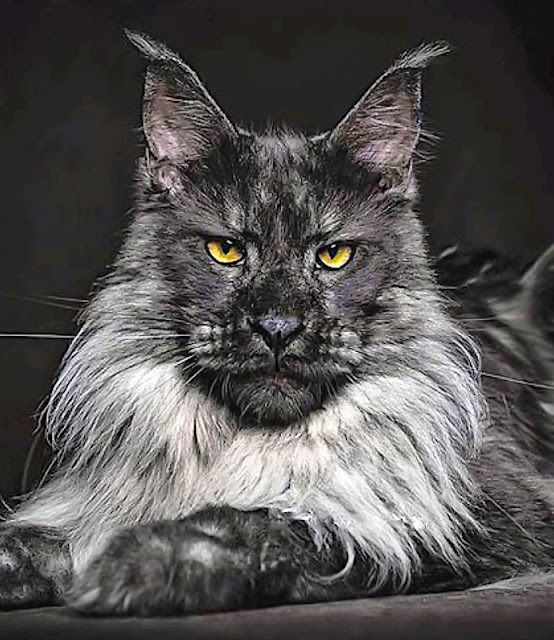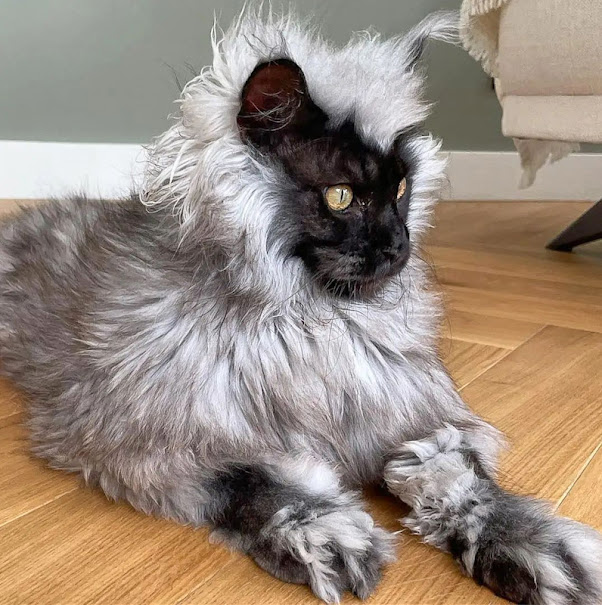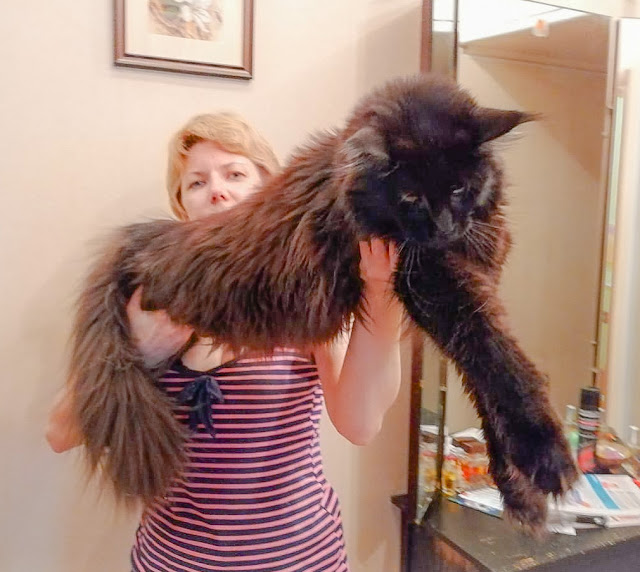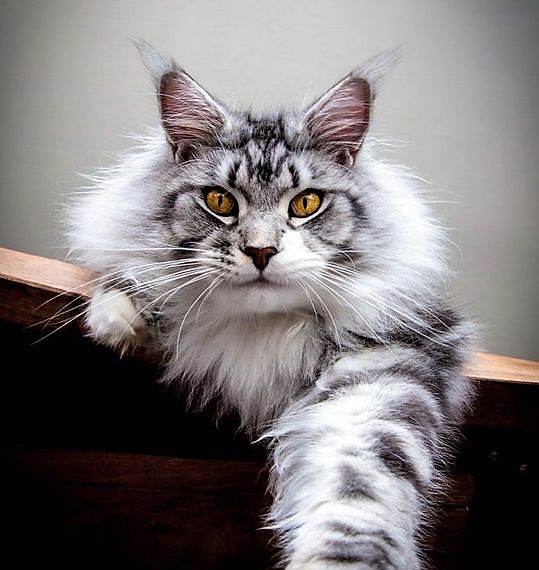Why don't Maine Coon cats meow?
Well, Maine Coon cats do actually meow but clearly some people think they don't otherwise they would not have asked the question. All domestic cats meow in their own way. Although some make a silent meow. Perhaps it is because the Maine Coon meow is a little bit special and sometimes doesn't sound like a conventional meow. For instance, in the video the Maine Coon responds to their human talking to them by using a trill/meow sound. Or they have a yowl/meow or a squeaky meow. But they're all, often, forms of the well-known meow.
But then again, the feline vocalisation which is called the "meow" is a very 'elastic' sound. Each individual cat has their own version of the meow. And this applies right across the board whether the cat is a Maine Coon or any other breed or any other random-bred cat.
"Their large size belies their tiny voice - for such big cats, they are fairly quiet".
That's a quote from Gloria Stephens who lives with Maine Coon cats and is a former cat show judge in the US and the author of 'legacy of the cat'. She should know.
Here is a video on TikTok about the voice not matching the face which is what Stephens is saying.
One prominent website, Maine Coon Central, says that Maine Coon cats do not meow in the conventional sense. I disagree with them. This is about the meow sound varying and being very flexible. Not every cat meows in the conventional way. And this applies to Maine Coon cats as well, which it should.
This website also states that they have been bred in a certain way which prevents him from meowing conventionally. Well, I agree that selective breeding probably has affected the sounds they make because the foundation cats selected happened to have their particular voice and this has been inherited in the blood lines.
 |
| Maine Coon being vocal. Image in public domain. |
And they state that when cats communicate with each other they don't meow at each other but they trill at each other. I agree that the meow has evolved to be a cat-to-human communication. It is a request or demand from a cat to a person normally.
But it is wrong to state that domestic cats do not communicate by meowing at each other. That statement is too absolute because kittens will meow to their mothers until they become adult. Kittens are, by definition, cats. Therefore, cats do communicate to other cat using the meow at least for a part of their lives.
I'm sorry to be boring but this leading Maine Coon cat website is error prone. They say that Maine Coon cats chatter as a substitute for meowing. This is entirely incorrect. All domestic cats, at some stage in their lives, have probably chattered their jaw at a bird or other animal outside the home. It is not a form of communication. It is instinctive and it is a cat practising their nape-of-the-neck death bite on the prey animal that they want the catch. They can't help themselves.
The website also states that Maine Coons meow a lot. Their article is very confusing. This clashes on my research with Gloria Stephens. Other people have said the same thing. They say that Maine Coons have tiny voices and are fairly quiet which is slightly surprising when you see their size. Perhaps that is why it is so noticeable.
Once again, the owner and author of this site states ask "Why are Maine Coons so vocal?" As I said, I do not think that they are particularly vocal in the same way that, for example, the Siamese is known to be vocal and quite raucous in their vocalisations.
The Maine Coon if anything is on the quiet side and certainly no more talkative than any other cat breed or individual cat. And I have personal experience of this in living with a couple of Maine Coons for two weeks when I stayed in America. They were great cats but they certainly were not vocal and talkative.
The same website asks a ridiculous question: "Do Maine Coon cats purr?" Of course, they bloody well purr because they are domestic cats! It is a question which is not worth asking.
The problem with this website that I'm referring to constantly is that the author is trying to fill up the page with meaningless guff in order to rank high on Google search and it appears to be working because Google is stupid. But the whole point of her writing is to be ranked by Google. It is not to provide genuinely good information.
The article ends here
------------------------------------
Ignore this section!
This section has been added to improve SEO. What I mean is that I'm going to do what the other website owner did and extend the article with waffle and see whether this page gets picked up better by the Google search engine. 😎👍😒😊😃👌
Perhaps you did not know but a friend of mine in America, the well-known cat photographer, Helmi Flick, told me that the Cat Fanciers' Association prefers Maine Coon cats to be more refined in appearance i.e. more polished which distances them, if you like, from their heritage which is as a semi-domesticated barn cat living in the state of Maine. These were the precursors of today's glamorous purebred cat.
And interestingly, the Cat Fanciers' Association's main competitor, The International Cat Association, prefer Maine Coons to be more like they were in times gone by which means more natural and rugged looking and I guess to this association the famous shaggy coat, as it is described, becomes more of a feature.
There are many theories about how the Maine Coon arrived in America. Almost applying common sense, it seems fairly clear that there were no Maine Coon cats and perhaps there were no domestic cats at all until the settlers from Europe came to America. And, of course, these cats were not called Maine Coon cats. They had no name (as a group) or description at all. They were moggies. They were just barn cats and semi-domesticated cat companions living quite a rough life.
Back in those days there were no veterinary surgeons and therefore these cats despite being domesticated were receiving the same kind of treatment as today's feral cats. And today's feral cats are said to live short lives; perhaps as short as about three or four years.
It would not surprise me if those early precursor cats to the Maine Coon in the state of Maine in the 17th century lived only for a few years. And it is likely that they would have been unsterilised and therefore would have been free to breed. That was probably necessary as it happens because of their short lifespan.
So, these early cats were just standard medium-longhaired and I guess shorthaired moggies. Their voices would have been typical of all moggies. This brings me to the article I just written about whether Maine Coon cats meow or not. They do meow but they might have a sound which is slightly different to other cats because they've been selectively bred from foundation cats and sometimes you get very few foundation cats from which an entire breed has been created.
As I recall, the Bengal cat is built upon the foundation of one or two original Asiatic leopard cat x domestic cat crosses. Just a very few cats at best and therefore the character of these first Bengal cats has been passed up the generations by genetic inheritance to the current Bengal cats. The same kind of thing may have happened with Maine Coons.
-------------------
There is an interesting article in the newspaper today which hints to me that the world is indeed becoming more concerned about animal welfare. It concerns the naming of diseases after animals. For example, monkeypox has nothing to do with monkeys. Monkeys happen to catch the disease in 1958 and humans in 1970. Monkeys don't transmit the disease to people. They catch the disease from rats and other rodents.
And there has been reports of monkeys being abused in Brazil. The reason is this disease is been named after monkeys which makes people fearful of monkeys and they learn to hate them. The World Health Organisation (WHO) is calling for a change to the name of the diseases.
Two others come to mind: chickenpox and swine flu. They are both derogatory of the animals after which the diseases are named. They should not be named in this way and I'm pleased that the WHO are campaigning for a change.










Comments
Post a Comment
Please share your Maine Coon experiences.